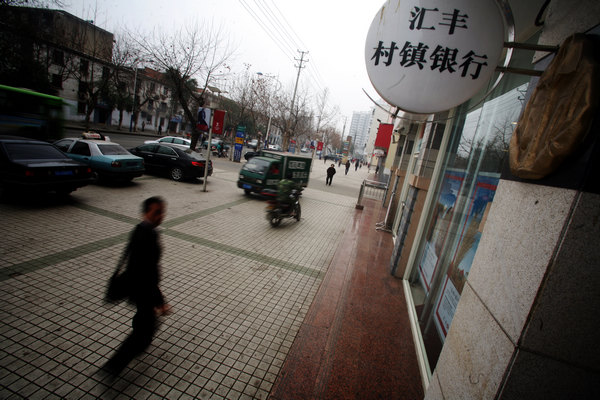Rural banks lend hand to farmers
Updated: 2011-12-07 07:20
By Wang Xiaotian (China Daily)
|
|||||||||
|
 |
|
HSBC has 17 village banks across China. This one, in Suizhou, Hubei province, opened in 2007. Provided to China Daily |
The competition
Tightening monetary policies have also helped the development of rural banking, said Xu of BFCB. "Since larger banks are lending less, clients are now turning to smaller banks."
Even so, more than one-third of the rural banks in China operate at a loss, a commission official said. However, by the end of 2010, nearly 70 percent of the new rural financial institutions realized a profit, said Yin Youxiang, a regulator with the commission.
"Emerging rural financial institutions such as rural banks are just in their take-off phase and only play a role in activating the local market, judging by the current situation," said Mao Hongjun, deputy director of the commission's cooperative finance supervision department. "Despite the rapid growth, they are still too weak to compete with rural credit cooperatives, which dominate the rural market at present."
Outstanding loans at rural banks in Shandong stand at about 8 billion yuan, compared with more than 580 billion yuan lent by local rural credit cooperatives, she said.
But the cooperatives are feeling the competition as rural banks and lending companies head for the underdeveloped regions.
In towns across Shandong, where rural banks compete most directly with rural credit cooperatives, the latter's market share is about 20 percent. That compares with the 50-60 percent market share in remote villages, said Song Wenxuan, director of the Shandong Rural Credit Union.
Foreign interest
Andrew Au, CEO of Citigroup China and chairman of Citibank (China), said access to credit is the most pressing financial need in many parts of China that are underserved by financial institutions. Financial services for deposits in those areas are already very mature.
Unlike its foreign counterparts, such as HSBC Bank and Standard Chartered, Citi China chose to be a lending company. It inaugurated its fourth lending company in a district adjacent to rural areas of Chong-qing in September.
In contrast to rural banks, lending companies in China do not take deposits although they do lend to individuals.
"It is still too early to make a judgment on which model is the best for the market," Au said.
Foreign banks have extended their rural networks in China, although more cautiously than some Chinese counterparts, since 2006. That's when the banking regulatory commission published guidelines to encourage banks to set up financial institutions in underdeveloped areas.
HSBC has set up 17 village banks across the country. Standard Chartered Bank has one, in Inner Mongolia, and ANZ has one, in Chongqing's Liangping county.
Additional risks
Ye Yunyan, a banking analyst at China Galaxy Securities, said the most important factor for financial institutions in rural areas is risk control. They must deal with financial demand that is much more scattered and irregular than in urban areas, with lack of collateral and with higher maintenance costs.
Some basic external operating systems are still not available in rural markets, which affects daily operation and management of rural banks, said a Chongqing banking regulator who declined to be named.
And most rural banks lack easy access to the central bank's settlement system. "That severely restricts their operations, especially in absorbing deposits," the official said.
Seeing the potential
Still, some lenders are optimistic. "The rural market in China is not necessarily high- risk," Citi's Au said. "I think it is a market with reasonable risk and reasonable return, based on our experience."
"China's rural communities are developing into larger towns, which presents huge growth potential and business opportunities," said Dang Pengjun, deputy head of strategic development at Bank of China. He said the bank aims to establish 400 rural banks nationwide in the next five years.
Rural banks play a very important role in financially supporting small and medium-sized enterprises (SMEs) and should be encouraged, said Zhou Dewen, chairman of the Wenzhou SMEs Development Association.
But the biggest obstacle to their rapid development, he said, still lies in that fact that private capital cannot initiate a rural bank directly.
"It's time to remove the threshold for private capital and implement some tax cut or subsidies for rural banks to let them better serve agriculture and SMEs without over-tight restrictions."
Li Xiang contributed to this report.











